It’s been a little over two months since the University of Oregon’s Hayward Field was demolished. Community members are still feeling its legacy — emotionally, nostalgically and, for local filmmaker Tim Lewis, legally.
Lewis was the protester who ran onto the historic venue’s track during its final NCAA Outdoor Track and Field Championships. He jogged around the track on June 8 wearing a T-shirt emblazoned with “Save Hayward” and holding up another with the words “Pre Lives For Now” written on it.
He was arrested by UO police on misdemeanor charges of interfering with police, disorderly conduct and criminal trespass at a sporting event. His case was dropped by the city on Aug. 22, a day before he was scheduled for a hearing at the Eugene Municipal Court.
“It’s sort of bittersweet, I guess,” Lewis says of the dropped case. “It feels like they started this game and then just took their ball and went home with it.”
Lewis says even if his case had gone to trial he still wouldn’t regret his actions. “Not at all,” he says.
“I mean, that day was an awesome day. It was really fun for me to get out there and see the reaction of the crowd,” Lewis says. “Plus, this was a place that I used to run when I was in high school and it was special to me, and also it was sort of in honor of my past and all the people who used to run there. And I’d do it again. If we did go to court and we lost, we would’ve appealed. We’d continue to play that silly game and continue to fight.”
Lewis says he was pretty confident things would have gone his way had he ended up in front of a jury.
His attorney Matt Watkins agrees that the case likely would have sided in Lewis’ favor, especially due to inconsistencies in the police report versus what occurred on the body camera video of the officer who arrested Lewis.
In the police body cam footage, available on the web version of this story at eugeneweekly.com, Lewis interacts with officers, inquiring why he’s being asked to leave and saying that he has a ticket to be in the stadium. The interaction lasted 20 seconds before Lewis was handcuffed.
“They were charging him with criminal trespass II, basically saying he remained unlawfully, which, the way the law works, that means he failed to obey an order to leave by person in charge,” Watkins says. “What seems to have happened in the video is that Tim is leaning in to hear him [the officer] and he says, ‘You’ve got to leave, you’ve got to leave, you’ve got to leave’ — then, handcuffs. So, there was no actual time to comply with the order to leave.”
Watkins adds: “If a person isn’t afforded an opportunity to comply, I don’t think a reasonable jury would have found that he had actually failed to comply when he wasn’t actually afforded the opportunity. So I think it would’ve been a waste of the city’s time and resources to prosecute this when the outcome seemed fairly clear.”
Watkins says that, regardless of the legality of Lewis’ case, people should be paying attention to why Lewis and others protest like this.
“I’ve analyzed this from a legal perspective, but Mr. Lewis also was protesting changes in the city and the way the university’s doing its business and a lot of people were really upset at the short notice before they tore down a historical building to basically turn UO into Nike University which has been the trend for the last several years,” Watkins says. “I think people should be paying more attention to that sort of thing.”
Now that both the East and West grandstands have been demolished, Lewis says he just wishes Hayward Field had received a more respectful goodbye from Phil Knight and associates.
“What really pisses me off is, not only that they could’ve done this in a completely different way and maintained the East Grandstand, but also, there was a little bit of a community uprising around respecting Hayward and its past and trying to create a stadium that had that kind of history to it,” Lewis says.
“And so Phil Knight and all these people hurried up and destroyed this historic place without any kind of wake or any kind of remembrance of it,” he continues. “They didn’t show it any respect. They never did that because they didn’t have any respect for it.”
